B2B: Dan the Automator and RJD2 Talk Hip-Hop History, the Limits of Sample-Based Production, and the Current State of Music
Though they initially made their names during slightly different eras of hip-hop production, both Dan […]
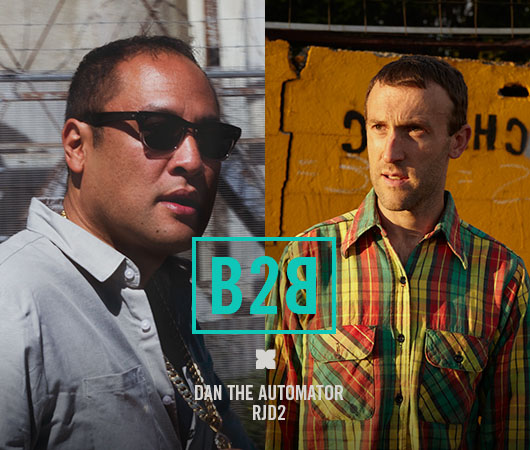
B2B: Dan the Automator and RJD2 Talk Hip-Hop History, the Limits of Sample-Based Production, and the Current State of Music
Though they initially made their names during slightly different eras of hip-hop production, both Dan […]

Though they initially made their names during slightly different eras of hip-hop production, both Dan the Automator (a.k.a. Dan Nakamura) and RJD2 (a.k.a. RJ Krohn) now stand as respected veterans in the world of instrumental beats. Through his various solo outings and absurdly long list of production credits (Dr. Octagon, Deltron 3030, and Handsome Boy Modeling School among them), Nakamura has proven to be a producer constantly in search of new sounds, while RJD2’s career has taken a similarly expansive path, with the Ohio native initially serving as the instrumental backbone of leftfield hip-hop label Definitive Jux before extending his talents into more freeform styles. Given these two artists’ intertwining passions and histories, we figured that now would be a good time to get the pair of luminaries together for a bit of back-and-forth conversation, particularly since the recently reunited Deltron 3030 just dropped its long-awaited sophomore LP and RJD2 is offering up a new LP of his own this week, More Than Isn’t. In this extended B2B session, Nakamura and Krohn give a glimpse into their turntablist and digging roots and explain why they both eventually moved beyond sample-based music; along the way, they also dole out their thoughts on today’s beat scene, SoundCloud, and modern hip-hop.
XLR8R: Considering that both of you have been producing music for well over a decade, what has kept you going and continuing to create? Is the inspiration the same as it’s always been, or are you constantly looking for new challenges?
Dan Nakamura: I’m pretty much only good at one thing—being artistic, and that shows itself mostly in terms of music. It’s what I do. Every time I do something, I learn something, and every time I learn something, it makes me want to try to do the next thing, so there’s just been a continual growth of always making stuff. A long time ago, I used to think I was really good at making music; then I found out I was terrible, then I finally got to a point where I was reasonably good. Once I got there and started doing a little bit more, I began to realize that there was no limit to things there were to try, so I’d keep trying those things, and that’s the cycle I’m on now.
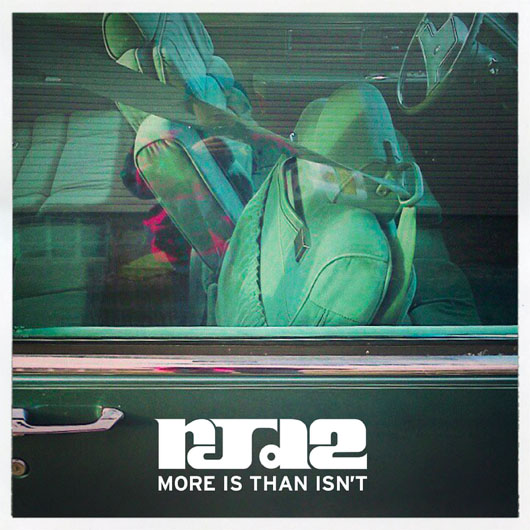
RJ Krohn: For me, the inspiration comes from trying as many things as possible. The more records that I make, in a way, in turn makes working on new records even harder. Making my first record was easy in a way because nothing was boring yet. The novelty of everything hadn’t worn off, so the spectrum of what I could do was completely wide open. Naturally for me, when I do something once—like use a specific vibe on a song—it actually makes it hard for me to repeat, because it just isn’t as interesting to me anymore. This has led me to always be chasing new ways to make music, and that leads me to incorporating new types of music, trying new genres, and that type of stuff. It can be challenging, but from a personal growth or development standpoint, it’s a lot more interesting to me that way.
Did both of you start by producing sample-based music?
DN: Actually, I started out by DJing, which is kind of an extension of sampling.
RJ, did you start out as a DJ too?
RJK: Yeah, I made the traditional progression from being a record collector to DJing and then getting a sampler. Each one leapfrogged into the next. I remember I was DJing for a while, and I got into a thing of trying to find records that people had sampled, so I could play the sample right after I played the Gangstarr song or whatever. At a certain point, I started realizing that there were all these samples on these records that no one had used yet. When that happens 30 times you start to think, “I should really get a sampler and start doing this.”
In 1997, I got my first MPC, and then, after a while, I hit a roadblock. I remember vividly after my first record came out that I had this sort of semi-panic attack as I realized that if I was going to do this as a career for a long time, I was going to always be fighting an uphill battle of trying to find source material on records, and so, right then and there, I realized I was going to have to branch out to continuously make the kind of music I wanted. When you are completely at the whim of whatever you find on record, it’s such an up and down thing. It can be very discouraging to take home 20 records and be like, “Fuck, I didn’t find one sample on these.” [laughs] I’d love to hear your thoughts on this, Dan. I feel like you’ve been able to move into the realm of live instrumentation in a way which still maintains the character that was present in your earlier records.
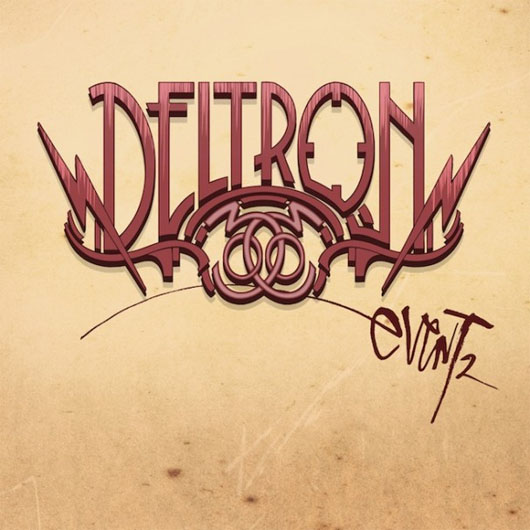
DN: Well, let me start with the earlier records. The biggest influences to me were bands like Public Enemy and Mantronix. Both were heavily production based—Public Enemy just stacked a ton of samples on a record. So I started from that background, and started making stuff in that nature—very out of key, which was kind of strange because I come from a musical background. I’ve been playing violin my whole life and understand key and tune and pitch, but I wasn’t really thinking about that stuff, because the whole idea of noise being used in this way was just so incredible to me. So I started trying to stack the coolest, grooviest stuff; doing same thing as you, looking for samples and such.
I think it was in the very early ’90s that I had a chance encounter with these kids who ended up being DJ Shadow, Chief Xcel, and all those guys—we had all just really started doing our thing. So I spent a few years helping engineer Entroducing… and spending time with Josh [Davis (a.k.a. DJ Shadow)] and those guys. They all kind of came to record with me because I had a little bit of a better handle on it, and me and Josh would shop for records two or three times a week, all the time. I was looking for breaks especially, because a break is a more useful foundation for starting to make music; you don’t have to deal with key and melody and all that stuff. Josh and I went to Europe and Texas together, like really looking, and he loved it. He still loves it, but I don’t love it. [laughs]
Josh and I kind of made opposite turns from each other philosophy-wise at some point where he was like, “I want to get every good record that was ever made ever.” I was like, “That’s cool,” and I like that stuff, but I wanted to buy gear. I wanted to be able to make stuff that sounds like records, and I wanted to be able to get those sounds and freak things out. At that point, I was just interested in how to generate those tones, and I would read about Joe Meek and recording [Led] Zeppelin and James Brown. I’m not a student of that, but I did spend a lot of time going into studios to see how things were made and how it all worked. So, instead of being able to say that I had a collection of high-school funk records from Texas, I could say I have this rack of Neve [preamps]. It was a different philosophy, and over time it served me well. A sample becomes limiting—you’re only able to go as far as you can chop that sample up. If you don’t have to worry about the sample, then you can go anywhere, and I wanted to have the ability to do that. My tone developed that way.
RJK: Yeah, I can totally relate to that trajectory. It’s interesting, I had the exact same pathway in terms of record digging. With guys like Josh—record-digger guys who are also producers—they have this duality when it comes to buying records. They can pull a record because they think there will be source material that they can sample from, or they can pull a record because it is an inherently collectible item. Honestly, the collector in me is a very dimly burning flame—I kind of just don’t care. [laughs] There was just a point when I realized that having a Clavinet or Wurlitzer was much more useful to me than having a record with a Clavinet or Wurlitzer sound on it.
DN: Exactly, that’s exactly right.
RJK: When all I had to rely on to make music was source material off of albums, I hit it hard. I was digging six or seven days a week. But as soon as I switched over to buying gear—particularly old gear—and trying to pick apart the engineering side of it, all of that same drive went into it.
One thing I wanted to ask you about, Dan, was that on almost all of your records, you really don’t shy away from modulating a song or having non-linear changes in a song. It sounds like you have a pretty firm grasp on music theory and such, so I’m wondering if that is something you think about, or if those sorts of exploratory chord changes come naturally to you?
DN: Well, here’s how it works for me. I took violin from the age of three to high school, and I was solid—nothing incredible—and it gave me a very good backbone of music in a particular way. I am way more comfortable doing single-note lines, but I don’t think in chords; that’s just not how I work… When I make a record, I don’t think about the changes as much as they come to meet at points, I think of it as a movie or something. Like, I’m in the third act, and I need to bring more drama or light. I see my bridges as the points of introspection where someone is asking themselves “What should I do?” The change that takes place is made to reflect that. So, I know how to get there musically, but the reason I go there is because of the emotional context. A lot of times, I like to stay locked down in sort of a hip-hop way. Sometimes I just want to ride the groove harder, but in recent years, I’ve gotten away from that a bit because I’ve been in this more musical adventure and more emotional mode.
RJK: I’ve noticed on both of the Deltron records that you are comfortable with having multiple sections of a song, harmonically speaking. As a long-time fan of rap music, I feel like that’s just such a severely underutilized tool, so when someone does it, I notice it immediately. I’m the kind of person, that if I hear 1-4-5 chord change, I will tune out within 30 seconds—unless it’s a really incredible song and something new is happening melodically. But to me, an interesting song lives and dies by its harmonic content. There are just those chord changes that you’ve heard ad nauseum on the radio since you were a kid, and if you hear them again your brain goes, “Oh, that again. I know what that is.” [laughs] For me, there are two types of music—one I can immediately transcribe in my head, and one that I can’t, and as soon as I hear one that I can’t, I’m intrigued. And your music has consistently had that aspect to it, basically.
DN: Yeah, I can understand where you’re coming from. On your records, I think you even sometimes go there rhythmically. I really don’t think about the songs in terms of changes though. I mean, I know they are there, but I always think of it in terms of emotion, because that’s what brings me there. I hear what you’re saying about the repetition of those same progressions, and I feel the same way, with the exception of AC/DC, because I can listen to them sometimes. [laughs]
How did you guys develop an ability to listen like that? Is it just from producing for so long?
RJK: For me, it came from the way I learned to make music. I’ve taken lessons, and went to a vocational music school for high school, but every encounter I’ve had with “traditional music education” has been a very bad experience, and it’s made me hate music. The things that make me like music, I tend to find when I’m exploring on my own. The whole reason I got into music was actually Led Zeppelin’s IV. That record had obviously been out for a while before I heard it because I was an ’80s baby, but a friend hipped me to it, and then he played the intro to “Stairway to Heaven” on a guitar, and I didn’t know you could do that; I didn’t know that you could perform something just as it existed on a record. So I decided I just had to learn that, and that is the moment that got me into music. For the rest of my life, I’ve basically been doing exactly that—taking songs that I like and learning them by ear. It gives you a very immediate understanding of intervals and chords, and for me at least, as soon as you learn the patterns, for the rest of your life, no matter where you hear it, you just know what that is.
DN: I don’t know where it comes from with me. I’ve been a big fan of music since the beginning and have always been listening and trying to understand what was happening, breaking down what sounds make it interesting and how the chords and melodies work together. But after a while, I began to start picking things apart less, and concentrating on the feel and what they did to get there. I was raised with the study of music and music theory. I have my own theory about music theory—not that it is a bad thing, it can be a great thing—but for me to be able to have enough music theory in my life to really understand what I’m doing when I make music, I would have had to study for all these years and never make a record. No matter what you are doing, in music-theory terms, someone can say you are making a mistake, but you are not. What you’re doing may be justified in book 10, when you’re only on book two. [laughs] There’s been a few times in my life where I’ve tried to really learn to play piano, and every time I do it, I start making shitty music, and I think it’s because I start locking myself into the beginner-y and intermediate level of music thought. Listening to music now for me can be weird in the sense that I don’t want to take it apart, but something in my head makes me take it apart.
RJK: Yeah, I definitely understand that, and that’s a thing that I actually struggled with for a long time. Do you want to keep certain listening pieces sacred and not know them like that? It’s got sort a Wizard of Oz, what’s-behind-the-curtain element to it. I’ve flip-flopped a lot on that issue, but in the last five years I’ve come down firmly on the side of picking it all apart, because I’ve realized that the more I discover music, the more I see that there is just such an insurmountable wealth of great music in the history of recorded audio, so I’m not worried about cannibalizing these things that I once felt sacred. I always walk away with a piece of knowledge from it. In a way, it’s kind of a weird detour from the digging instinct that we were talking about earlier.
Are either of you very aware of the current crop of beat music, particularly the stuff that can be traced back to the LA scene with guys like Flying Lotus and Gaslamp Killer? Do you think that side of instrumental “beat music” comes from a lineage of what you guys started, or do you hear it as something different?
RJK: I’m not uber-versed in it, but I think it’s really cool, personally. It seems like it’s not entirely monochromatic to me. I wouldn’t put Glitch Mob next to Gaslamp Killer or something like that, even though on paper you could maybe consider them of the same scene. What I really appreciate about a lot of that stuff is that they are not aiming at the same targets as I was when I started doing this. That’s something I really appreciate. When I listen to guys like Flying Lotus or Gaslamp Killer, I feel like I’m listening to music that comes from a fundamentally different perspective than me and I like that; it’s exciting to me.
DN: I tend to agree. The genesis of that form seems to have taken place more alongside the technology, and I think that certain people have embraced that and headed more that way. I feel like a lot of that stuff is more reminiscent of artists like Autechre than with someone who was doing more soul and groovy beats. I personally prefer their newer genesis of it because it’s more interesting when people expand on that form. I feel like it’s more of a music-making culture than a beat-making culture. I’m not into [beat music] when it sounds like a rehashing of something that’s already been done. I just don’t see the need for that.
RJK: Definitely. As a guy who cut his teeth on an MPC, when I hear some “new” instrumental hip-hop records that scream MPC soul sample, I don’t think it sucks, but even it’s a great track, I’m not intrigued in the same way as I am when I hear something that doesn’t sound like it comes from the MPC perspective, or a continuation of what Dan, Josh, or I was doing years ago. The people that those LA guys looked up to were probably just as much 808 guys or Maschine guys as they were MPC or ASR-10 guys. It sounds like computer music to me, basically, and I don’t mean that in a bad way. I mean that in the sense that it is pulling from a multitude of platforms—part sample, part drum machine, and part Pro Tools sessions, and in a way it’s sort of indefinable, which makes it more interesting than when I listen to something and think, “Shit, any of us could have done that 10 years ago.” [laughs]
Deltron 3030 by Michael Donovan
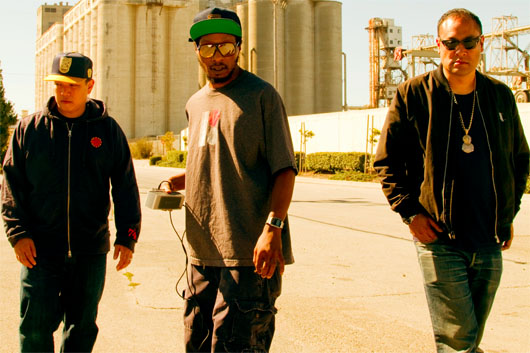
What do you guys make of the SoundCloud community of beatmakers? There are some people that would say it’s sort of helped spawn a copycat kind of mentality, with a lot of people painting by numbers with their productions in order to gain fans and such.
DN: Well, the way I’d put it is like this: People can do whatever they want musically, artistically, whatever. If we’re talking about purely the politics and business of music, financially, you’re kind of rewarded for doing the same thing you or someone else was doing as long as it was successful. Lex Luger is actually a good example. People really co-opted his sound, but why? If you can make hits and make money doing it, then more power to you, but artistically, I don’t think it’s that rewarding to just be making a second- or third-rate version of whoever has the hot track right now. Some people treat music as a business, but I personally don’t, so to me, we’re not really in the same business. But my big point to this whole thing is: Look at a record like Jay-Z’s Magna Carta; not that it’s the greatest record, but all the people who do production on there have been doing this stuff for 10 or 20 years. And you know why? It’s because they change it up and do different things. Not everything they do is my favorite, but the staying power of these guys and guys like RJ and myself, just doing what we’re doing, it keeps going on in a way that allows us to make the records we actually want to make.
RJK: Yeah, I wholeheartedly agree with that. People biting other people doesn’t bother me in the least. In fact, to be purely crass about it, for people like me, it just makes it easier. I’m looking for holes, I’m looking for some shit that isn’t being done. From a creative standpoint, I need a space to occupy that only I am occupying. So more people doing one thing, in a way, makes it easier for people like me—the more people that aim at target “A,” it just leaves all those other targets open.
DN: I’m not necessarily looking for my own place in the world sonically—I just have it. And what I mean by that is that I make stuff because I want to make it. I like what’s going on and I hear these great records and I’m inspired by them once in a while, but when I’m done, it sounds 100 percent nothing like it, because I’m not meant to do that. I’ll hear something that knocks and try to play around with a similar idea and then, 10 minutes later, it’s taken 18 lefts and you couldn’t even imagine what I started out thinking about. [laughs] With trap for instance, there are a lot of watered-down versions of watered-down versions, and it’s like, I’ve seen this before. I’ve seen people on the East Coast try to sound like DJ Premier, people on the West Coast try to sound like Dr. Dre, others try to sound like Pete Rock—it never works.
RJK: Yeah, I remember when I knew five producers who wanted to sound exactly like RZA, then it was Dilla, and the list just goes on. The funny thing about it is that you really have to work hard to not make those detours and left turns Dan was talking about. If you’re really making music for your own enjoyment, you just can’t stop thinking about things to try, and then sooner or later you’re off trying to satisfy yourself and make something you find interesting. But you have to turn all of that off, just kill that spirit that’s within you, if you’re trying to clone someone else’s sound. [laughs]
Hearing you guys talk about digging with DJ Shadow and hearing Public Enemy for the first time, it sort of sounds magical now, with hindsight. Do you think the current state of music is more stale or stringent in some ways?
DN: I actually have something to say about that—it’s not stale right now. It’s the most wild, innovative time ever, and I can tell you why. It’s because no one knows what they are doing. You have no labels, no power, and no monopolies right now. Labels will barely promote their big acts right now. It’s a time when anything can happen. There are YouTube superstars—not that they’re my favorite acts at all—but 10 years ago or so, to get a song all over the radio there was money to be spent, stuff to buy—if you know what I’m saying—and even then, there were only so many slots for sale and if you were not on a major and you were not a priority, then it wasn’t going to happen. But now, who knows? It’s terrible in a sense that anyone can make a record with their laptop at a coffee shop, but it’s only terrible because you get a lot of terrible music. The fact of the matter is, that same technology is going to end up in the hands of a genius as well.
RJD2 by Ben Mistak
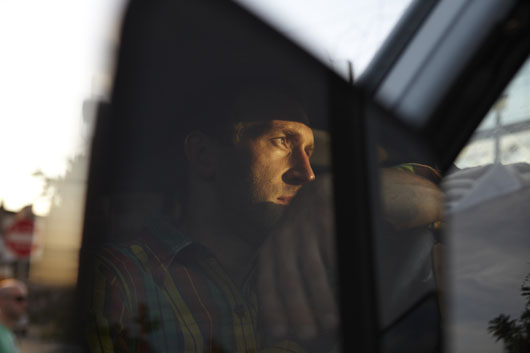
RJK: Dan’s totally right. If you look at the landscape of what’s going on in music, a big part of it is that you have guys that don’t give a fuck about the “rules of music,” and with that, you’re going to get great results. If we were to go back 10 years to the era of late Bad Boy and early Neptunes ruling the radio, you kind of knew what you were going to get if you turned on top-40 urban radio. Like, the new Mystikal single wasn’t really that far off from the new Jay-Z single all that often. But now, you have songs like “Look At Me Now,” the Chris Brown track. That fucking song is in no key. There is no key. [laughs] It’s not in A-flat, it’s in nothing. There’s a lot of stuff like that—just a 70-bpm track with a few sounds and that’s it, the track is done. Let’s be real, that’s pretty fucking avant-garde. But at the same time, you can turn on the radio and hear Miguel or something, and it’s smooth and pretty and has a groove, and maybe there are some funk references to it. It just goes on and on and on. I’m not saying the music is great, but I do feel like we’re living in a time where anything can fucking happen.
DN: I’ll co-sign on that, 100 percent. That’s why it’s so exciting. Sure, there’s a bunch of crap and riff-raff that comes with that, but I think all that has to exist for it to be this way.
RJK: That’s why I sort of respect guys like Hitboy and Lex Luger and guys like that. I might not like every track that they do, but you can hear in their music that they don’t give a fuck about your music theory lessons, dude. [laughs] You can hear it in their tracks, and I really like that. It gives me the same feeling of when you heard a Public Enemy record and you couldn’t make sense of it. People would ask you, “Is this music?” People are saying a lot of the same things about music on the radio right now, and I like that.

